ABOUT US
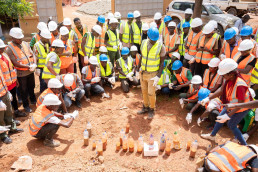
The ACP-EU Development Minerals Programme, implemented in partnership with UNDP, works to improve livelihoods and inclusion of artisanal and small-scale miners (ASM) working in Development Minerals value chains in African, Caribbean and Pacific (ACP) countries. The Programme is developed jointly by the Organisation of African, Caribbean and Pacific States (OACPS) and the European Union (EU) and is funded under the 11th European Development Fund (EDF).
The Programme has been implemented in 10 countries. Through knowledge sharing, it also benefits a wider group of ACP countries. The Programme also supports the African Mineral Development Centre in partnership with the African Union Commission. The Programme aims to increase competitiveness and incomes of artisanal and small-scale enterprises in mining and mineral processing and help grow inclusive and sustainable Development Minerals value chains.
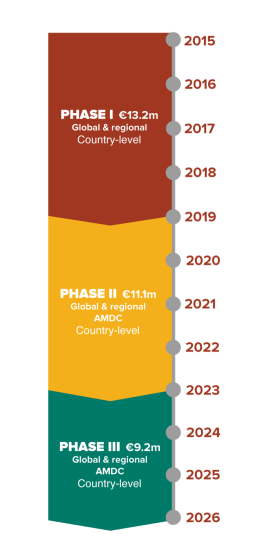
What are Development Minerals?
Development Minerals are mined, processed, manufactured and mostly used domestically in industries such as construction, manufacturing, infrastructure and agriculture
Industrial minerals
limestone, gypsum, salt
Construction materials
sand, gravel, clay
Dimension stones
limestone, gypsum, salt
Semi-precious stones
garnet, agate, tourmaline
8 of the top 10
produced mineral commodities in the world are Development Minerals
Development Minerals account for
84%
of global mineral production
Development Minerals are also known as common minerals or low-value minerals. Many Development Minerals are non-metallic minerals and minerals used in construction.
Development Minerals are largely mined by artisanal and small-scale mining enterprises and cooperatives (ASMEs) in African, Caribbean and Pacific countries. They generate important domestic economic revenues and linkages and have a high impact on livelihoods, economic well-being of local communities and poverty reduction. More than 40 million artisanal and small-scale miners (ASM) worldwide contribute to local economies and meeting the rising demand for minerals used in everything from smartphones and solar panels to the construction of roads and buildings.
OUR WORK
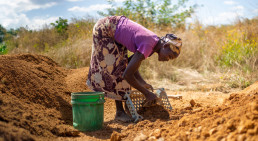
The ACP-EU Development Minerals Programme works to increase competitiveness and incomes of artisanal (informal) and small-scale enterprises in mining and mineral processing (ASMEs) and support inclusive and sustainable Development Minerals value chains across African, Caribbean, and Pacific (ACP) countries. It addresses key challenges by promoting an enabling environment, empowering artisanal miners, helping develop value chains, prioritizing women’s empowerment, and facilitating knowledge generation and sharing. By focusing on capacity building of institutions of ASM and promoting responsible practices, the Programme aims to unlock the potential of Development Minerals to contribute to inclusive and sustainable economic development within these regions. From 2024, the Programme also works to promote low-carbon, circular materials and processes.

Enabling environment
-
- Supporting policies and institutions
- Geological and mineral information
- Digitization
Artisanal and small-scale mining
-
- Supporting organization and formalization of ASM
- Strengthening environmental, social, governance (ESG)
and safety practices in ASM - Empowering women in artisanal mining
Business and value chain development
-
- Enhancing entrepreneurship and business development
Value addition and low-carbon materials
-
- Building skills for value-addition to Development Minerals
- Innovation in low-carbon and environmentally friendly construction materials
Knowledge creation and sharing
-
- Research and evidence base
- Knowledge exchange between African, Caribbean and Pacific countries
African Minerals Development Centre (AMDC)
-
- Strengthening the institutional capacity of AMDC
HOW WE WORK
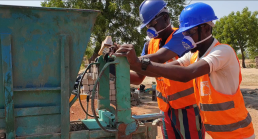
Capacity building:
Training programmes, knowledge exchange platforms, skills development
Evidence for decision making:
Creating a knowledge base, maps, assessments and studies
Supporting policy reforms:
Analyses and participatory consultations on laws and policies and practices
Practical initiatives:
Small grants, innovative pilots and initiatives
OUR ACHIEVEMENTS
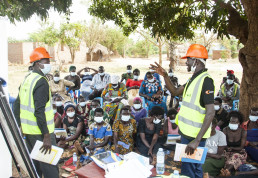
The Programme supported countries to create a more enabling environment for artisanal and small-scale miners of Development Minerals and strengthen the capacities of artisanal miners and public institutions. It contributed to policies, strategies, laws and actions on strengthening the Development Minerals sector in programme countries.
40+
ACP countries benefitted from the Programme
10
Countries received direct support
Formalization and business acceleration strategies developed in Uganda, Zambia, Cameroon and Guinea, which informed the African continental strategy on ASM
Paved the way for the historic Mosi-Oa Tunya Declaration reaffirming the rights of Artisanal and Small-Scale miners
CAPACITY DEVELOPMENT
The Programme organized extensive country-level and regional training for artisanal miners and public officials. These included training of trainers and resource people to further amplify the reach of the training.
350+ trainings delivered
14 000+ people trained
Trainings in:
-
- Administration and governance of ASM
- Health and safety in ASM
- Mine and quarry management
- Business and finance
- Environmental and social practices in ASM
- Value-addition and promotion of low-carbon materials
300+ trainings delivered
20 000+ people trained
Trainings in:
-
- Administration and governance of ASM
- Health and safety in ASM
- Mine and quarry management
- Business and finance
- Environmental and social practices in ASM
- Value-addition and promotion of low-carbon materials
KNOWLEDGE EXCHANGE
The Programme organized extensive knowledge exchange at global, regional and country levels on:
-
- Advocating for policy changes on artisanal and small-scale mining
- Sharing lessons learned and good practices
- Building knowledge about low-carbon materials−produced by value-addition to Development Minerals
- Enabling country-to-country exchanges
220+
knowledge sharing and South-South Cooperation events
29 000+
participants
EVIDENCE BASE
Baseline studies and censuses on Development Minerals in
10 ACP countries
To fill the gaps in information about the Development Minerals sector and improve transparency, the Programme carried out assessments, training and introduced digital tools.
-
- Baseline studies and censuses on Development Minerals in ACP Countries
- Digitization of geological data in Zambia and Fiji
- Open source-based mining cadastre in Jamaica
- Training of young geologists in geodata digitization and management
- Fieldwork in countries to map deposits of Development Minerals for sustainable sourcing
- Mapping land degradation and deforestation in Cameroon
- Developed an earth observation tool, part of the Digital Earth Pacific, to detect illegal mining in Fiji
- Building knowledge about low-carbon materials−produced by value-addition to Development Minerals
ORGANIZATION AND FORMALIZATION OF ARTISANAL MINING
The Programme worked extensively with artisanal and small-scale miners. It worked with governments to improve or create systems of formalization of ASM and provide extension services to artisanal miners.
400+
artisanal and small-scale mining cooperatives formalized with
21 000+
members in Burkina Faso, Cameroon, Congo Republic, Guinea, Uganda, Tanzania and Zambia
250+
government officials (40% women) trained as trainers to provide extension services to ASM
4 000
artisanal miners reached through ASM training and formalization marathon in Uganda
4 500+
artisanal miners sensitized on formalization in Zambia
10 000+
artisanal miners joined 64 cooperatives and formed the National Federation of Artisanal and Small Scale Miners of Development Minerals in Guinea
ENVIRONMENTAL, SOCIAL, GOVERNANCE AND SAFETY PRACTICES
The Programme provides training on and promotes practices for better health, safety and environmental management practices, and social cohesion in artisanal and small-scale mining communities. It brings laws and regulations to the field, helping better implementation of laws in practice
-
- Developed ASM-friendly environmental management toolkit in Zambia, bringing environmental regulations to the doorsteps of artisanal miners
- Supported extension services by local governments and mining authorities to over 1,600 artisanal and small-scale miners in Zambia
- Collaborated with local officials and communities for restoration of land degraded by mining activities in Uganda
- Spearheaded and implemented a Green Mining Initiative in Cameroon
- Developed a conflict management app for early warning of environmental and social problems of mining and quarrying in Jamaica
- Developed guidelines for environmentally sustainable mining and for building disaster and climate resilience through Development Minerals in Fiji
WOMEN’S EMPOWERMENT
The Programme implements targeted initiatives to support women artisanal miners and women’s mining cooperatives, enhance their leadership skills and standing. It also has extensive reach to women through inclusive training and capacity building programmes.
Results of a survey of ASM cooperatives and enterprises supported by the Programme conducted in 2022
of training participants are women
of employees are women
have improved working conditions for women
have women in leadership positions
From the results of 2022 survey of ASM cooperatives and enterprises supported by the Programme
BUSINESS AND ENTERPRENEURSHIP DEVELOPMENT
Access to markets and access to finance by ASM is hindered by low productivity and poor environmental, social and governance (ESG) practices. Through skills training, events and small grants, the Programme helped improve the businesses and incomes of artisanal and small-scale mining and value-addition.
- Over 20,000 people in artisanal and small-scale mining and artisans’ communities benefitted directly and indirectly from small grants to improve productivity and incomes, and implement initiatives to improve environmental management
- Supported participation of artisanal businesses and SMEs in product and business fairs in Cameroon, Zambia, Uganda and Jamaica to improve access to markets
- Supported women-run associations with small grants to increase their production and sell products at the regional level
- Implemented trainings for women and youth employment initiatives in Uganda and Cameroon
- Conducted reserve estimation training and awareness raising to facilitate access to finance in Jamaica and Uganda
SKILLS FOR VALUE-ADDITION AND LOW-CARBON MATERIALS
The Programme promotes new initiatives to support countries in business and value chain development, and value-addition to Development Minerals to produce low-carbon, circular materials and skills development for youth.
Research
and knowledge sharing sessions
to raise knowledge and awareness about low-carbon minerals at global and regional fora
Trainings in mineral processing and value addition skills
to produce eco-bricks in Cameroon, Guinea, Burkina Faso and the Republic of Congo
Explored and tested productivity
enhancing, affordable technologies for artisanal and small-scale mining enterprises in Tanzania and Zambia
Supplier development initiatives
in Cameroon and Zambia for SME development in Development Minerals sector
Sustainable sourcing and pilot production initiatives
for low-carbon building materials in Fiji and Cameroon
Training for artisans
and empowering inner-city communities in Jamaica and traditional communities in Fiji
PARTNERS
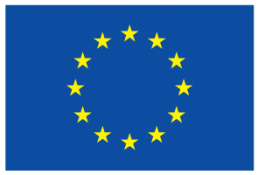
The European Union (EU)
The European Union (EU) is the principal funder of the ACP-EU Development Minerals Programme. The Programme aligns with the European Union’s Global Gateway strategy, launched in 2021, which promotes sustainable and inclusive infrastructure investment with a particular focus on Africa, Latin America, and Central Asia.
Through the Global Gateway, the EU aims to support partner countries in responsibly extracting and adding value to their mineral raw materials, thereby fostering sustainable and resilient minerals value chains in line with the Sustainable Development Goals (SDGs).

Organisation of African, Caribbean and Pacific States (OACPS)
The ACP-EU Development Minerals Programme serves the member states of the Organisation of African, Caribbean and Pacific States (OACPS), reinforcing its commitment to inclusive and sustainable development across these regions.
The OACPS, formerly known as the ACP Group, was established through the Georgetown Agreement in 1975 and comprises 79 member states from Africa, the Caribbean, and the Pacific. Its core mission is to promote the sustainable development of its members and their gradual integration into the global economy, with the ultimate aim of reducing and eventually eradicating poverty.
The Organisation also plays a central role in coordinating the implementation of the Partnership Agreement with the European Union, fostering unity and solidarity among its members. It advocates for multilateralism, supports peace, security, and democratic governance, and prioritizes the empowerment of youth and women across its member states.
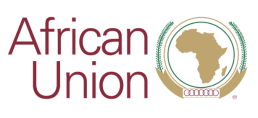
African Union Commission (AUC):
The Programme supports the institutional capacity of the African Minerals Development Centre (AMDC), mandated as the implementing agency of the African Union Commission in the field of minerals.
The African Union Commission is the implementing body of the African Union (AU) – the African continental body consisting of the 55 member states. It was officially launched in 2002 as a successor to the Organisation of African Unity (OAU, 1963-1999).
The ACP-EU Development Minerals Programme partners closely with the African Union (AU) through the African Minerals Development Centre (AMDC), a Specialized Agency of the AU dedicated to implementing the Africa Mining Vision (AMV). Adopted by African Heads of State in 2009, the AMV provides a strategic framework for harnessing Africa’s mineral resources to drive inclusive, sustainable development and structural transformation.
Through this partnership, the ACP-EU Development Minerals Programme supports the institutional capacity of AMDC to strengthen policies, institutional frameworks, and capacity in the management of minerals and integrate minerals into broader mineral governance systems, support formalization and value addition, and align national strategies with continental priorities under the AMV and Agenda 2063.
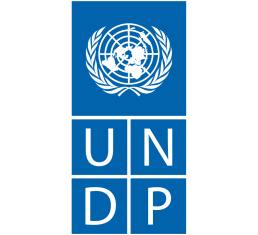
United Nations Development Programme (UNDP)
UNDP is the leading United Nations organization fighting to end the injustice of poverty, inequality, and climate change. Working with our broad network of experts and partners in 170 countries, we help nations to build integrated, lasting solutions for people and planet.
UNDP is the co-funding and implementing partner of the ACP-EU Development Minerals Programme.
Recognizing the significant social, environmental, and economic impacts of extractive industries, UNDP adopted a Strategy for Supporting Sustainable and Equitable Management of the Extractive Industries which guides its efforts to ensure that natural resource wealth contributes to improving lives and advancing sustainable development.
UNDP collaborates with governments, civil society, the private sector, academia, and local communities to promote responsible governance of extractive industries, in line with global best practices and national development priorities.

